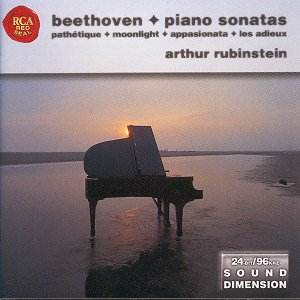While EMI, Decca and the BBC bring out their "Legends"
and their "Great Recordings of the 20th Century",
BMG give us a compilation of most of Rubinsteinís Beethoven sonata interpretations
(he was of the generation that mostly stuck to the famous sonatas with
names, though he was also a wonderful exponent of op. 31/3) in a series
aimed basically at first-time classical buyers. If Rubinstein was not
always considered a Beethoven interpreter par excellence, novices
will encounter the music in the hands of one of the 20th
Centuryís great communicators; far better this than a barely competent
animal going through the traditional motions. They will also find a
brief note explaining "Viennese Classical Music" (sorry, "viennese
classical music": who started all this nonsense about titles in
small letters, and isnít it about time it stopped? CD Booklets arenít
poems by e.e. cummings; would they were!), "beethovenís" piano
sonatas and the sonatas in question. All very listener-friendly but
not reductively so. My only real niggle is that the writer seems to
have expectations of more traditional interpretation than those on the
record. They will also get a brief note on the pianist, and will learn
that in 1916-17 he gave over 100 concerts in Spain "and became
one of the most important interpreters of Spanish music". If they
donít already know that he played Chopin rather often, they wonít learn
that here.
Any suspicions that Rubinstein might prove unduly avuncular
in Beethoven are practically dispelled by the first chord of the "Pathétique".
Also dispelled are any worries one might have about the recording. I
donít know where that close, clattery sound we always used to think
part and parcel of Rubinsteinís recordings has gone, for Iíve never
heard him sound so warm and rich on record, or so close to the sound
I remember from the one occasion (alas!) on which I heard him live.
True, the "Appassionata" from a year later is a little harder,
but without the comparison I would have found little to fault in it.
There will be rejoicing in heaven over this.
It could perhaps have been taken for granted that Rubinstein
would be a wonderfully songful interpreter of all four slow movements,
rich in sonority, detailed and natural in phrasing, alive to contrapuntal
movement in the bass lines and inner parts. He is also one of the few
who can really say something with the middle movement of the "Moonlight",
often thrown away as a bland intermezzo.
It might also have been expected that he would take
his time over the outer movements, but thanks to the fullness of his
tone (every note on the CD tells) and the clarity of his left-hand
work (you will hear whole passages in all finales in which he prefers
crystalline detail where others give us a blur of pedal), the true Beethovenian
drive is emphatically present. As a result of not rushing his fences
in the "Appassionata" finale, the presto, when it arrives,
is overwhelming. He also uncovers much detail in the first movements.
Who else has made the exchanges between the lower and upper registers
(right-hand crossing over left) in the second subject of op. 13 speak
like this? You can imagine an operatic duet between soprano and baritone.
Only in the first movement of "Les Adieux" did I feel that
perhaps he was taking things a little comfortably, though with much
insightful phrasing.
If Rubinstein still seems a not entirely orthodox Beethoven
interpreter, it is because he remained a romantic artist dedicated to
telling a story rather than expounding a structure. This may not necessarily
be wrong, but our Beethovenian clocks were set by Schnabel in the 1930s
and basically our expectations have remained in line with this ever
since. Rubinstein learnt his Beethoven before the Schnabel revolution.
However, while even the most highly-esteemed pre-Schnabel interpreters
sound odd to present-day ears, Rubinstein was not only an intuitive
and a romantic pianist, he was also a highly intelligent one with a
great respect for the printed score.
So, to get back to my first point, firstĖtimers will
encounter this music in richly communicative performances. But I hope
circulation of this disc will not stop there. Anyone with a fair stock
of "conventional" Beethoven, not to speak of collectors of
"Legends" who did not buy these as part of the Rubinstein
edition, should get them now. Beethoven speaks to all men in many ways,
and there will be times when Rubinsteinís very human way will bring
the music closer to you than any other.
Christopher Howell


